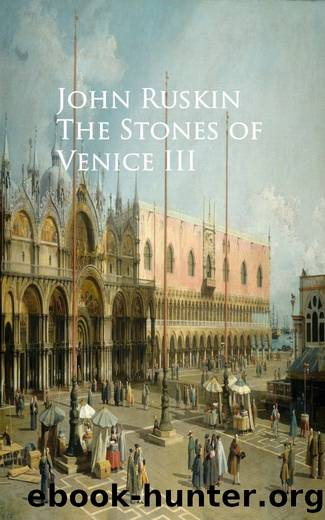The Stones of Venice III by John Ruskin

Author:John Ruskin [Ruskin, John]
Language: eng
Format: epub
Published: 2016-07-30T00:00:00+00:00
§ XXVII. Only observe, in this matter, that a greater degree of realization is often allowed, for the sake of color, than would be right without it. For there is not any distinction between the artists of the inferior and the nobler schools more definite than this; that the first color for the sake of realization, and the second realize for the sake of color. I hope that, in the fifth chapter, enough has been said to show the nobility of color, though it is a subject on which I would fain enlarge whenever I approach it: for there is none that needs more to be insisted upon, chiefly on account of the opposition of the persons who have no eye for color, and who, being therefore unable to understand that it is just as divine and distinct in its power as music (only infinitely more varied in its harmonies), talk of it as if it were inferior and servile with respect to the other powers of art; 53 whereas it is so far from being this, that wherever it enters it must take the mastery, and, whatever else is sacrificed for its sake, it, at least, must be right. This is partly the case even with music: it is at our choice, whether we will accompany a poem with music, or not; but, if we do, the music must be right, and neither discordant nor inexpressive. The goodness and sweetness of the poem cannot save it, if the music be harsh or false; but, if the music be right, the poem may be insipid or inharmonious, and still saved by the notes to which it is wedded. But this is far more true of color. If that be wrong, all is wrong. No amount of expression or invention can redeem an ill-colored picture; while, on the other hand, if the color be right, there is nothing it will not raise or redeem; and, therefore, wherever color enters at all, anything may be sacrificed to it, and, rather than it should be false or feeble, everything must be sacrificed to it: so that, when an artist touches color, it is the same thing as when a poet takes up a musical instrument; he implies, in so doing, that he is a master, up to a certain point, of that instrument, and can produce sweet sound from it, and is able to fit the course and measure of his words to its tones, which, if he be not able to do, he had better not have touched it. In like manner, to add color to a drawing is to undertake for the perfection of a visible music, which, if it be false, will utterly and assuredly mar the whole work; if true, proportionately elevate it, according to its power and sweetness. But, in no case ought the color to be added in order to increase the realization. The drawing or engraving is all that the imagination needs. To “paint” the subject merely to make it more real, is only to insult the imaginative power and to vulgarize the whole.
Download
This site does not store any files on its server. We only index and link to content provided by other sites. Please contact the content providers to delete copyright contents if any and email us, we'll remove relevant links or contents immediately.
| African | Asian |
| Australian & Oceanian | Canadian |
| Caribbean & Latin American | European |
| Jewish | Middle Eastern |
| Russian | United States |
4 3 2 1: A Novel by Paul Auster(11049)
The handmaid's tale by Margaret Atwood(6852)
Giovanni's Room by James Baldwin(5878)
Big Magic: Creative Living Beyond Fear by Elizabeth Gilbert(4723)
Asking the Right Questions: A Guide to Critical Thinking by M. Neil Browne & Stuart M. Keeley(4574)
On Writing A Memoir of the Craft by Stephen King(4213)
Ego Is the Enemy by Ryan Holiday(3991)
Ken Follett - World without end by Ken Follett(3972)
The Body: A Guide for Occupants by Bill Bryson(3801)
Bluets by Maggie Nelson(3710)
Adulting by Kelly Williams Brown(3670)
Guilty Pleasures by Laurell K Hamilton(3586)
Eat That Frog! by Brian Tracy(3514)
White Noise - A Novel by Don DeLillo(3435)
The Poetry of Pablo Neruda by Pablo Neruda(3367)
Alive: The Story of the Andes Survivors by Piers Paul Read(3310)
The Bookshop by Penelope Fitzgerald(3226)
The Book of Joy by Dalai Lama(3218)
Fingerprints of the Gods by Graham Hancock(3212)
